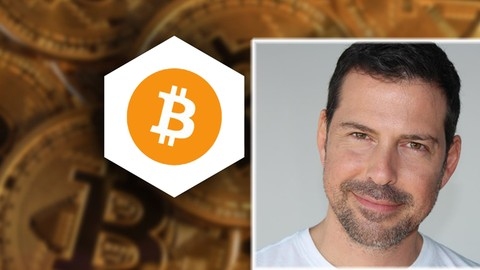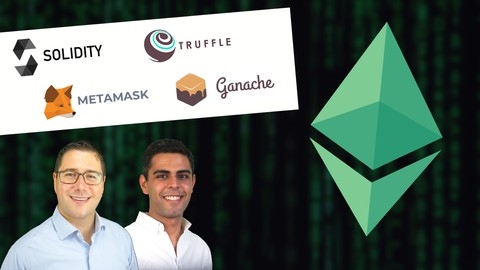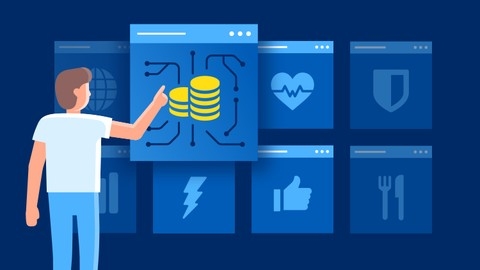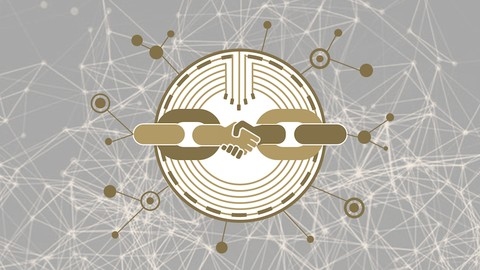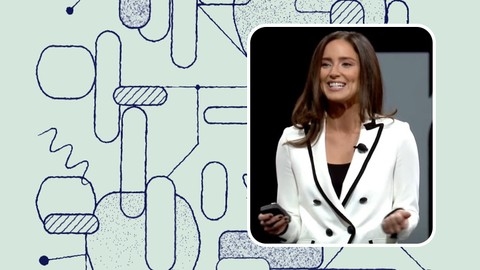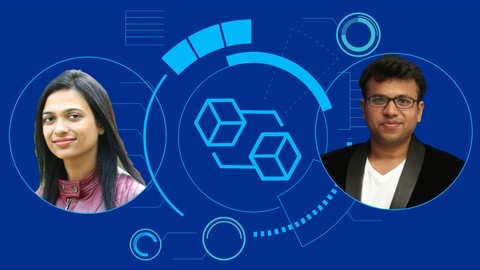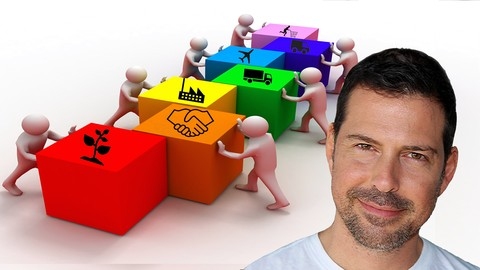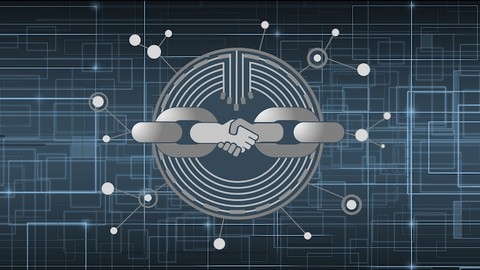Blockchain technology is revolutionizing the way we interact with data and value.
It’s a decentralized, secure, and transparent system that enables trustless transactions and fosters innovation across various industries.
Mastering blockchain opens doors to exciting career opportunities in fields like cryptocurrency, finance, and cybersecurity.
Finding the right blockchain course on Udemy can be a challenging task.
You’re looking for a program that’s comprehensive, engaging, and taught by experts, but also fits your learning style and goals.
You want a course that goes beyond theoretical concepts and provides hands-on experience to build real-world blockchain applications.
For the best overall blockchain course on Udemy, we recommend Blockchain and Bitcoin Fundamentals.
This course provides a thorough introduction to the fundamentals of blockchain technology, focusing on the core concepts and practical applications.
It covers Bitcoin’s origin, mining process, and controlled supply, while delving into advanced topics like Merkle Trees and blockchain’s broader impact on various industries.
The course also guides you through choosing a wallet, sending and receiving bitcoins, and storing them safely.
While Blockchain and Bitcoin Fundamentals is our top pick, Udemy offers a plethora of other great blockchain courses.
Explore our comprehensive list to discover options tailored to your specific needs and learning goals, from introductory courses to advanced programs focused on building your own blockchain or diving deep into Ethereum development.
Blockchain and Bitcoin Fundamentals
You will start your journey by understanding what blockchain is and how it works, including the role of cryptographic hashing and distributed ledgers.
The course covers the fundamentals of Bitcoin, such as its origin, mining process, and the controlled supply of bitcoins.
You will learn about the four main components of Bitcoin and how they work together seamlessly.
The course explains key concepts like the “Coinbase” transaction and takes you on a virtual fieldtrip through block explorers and other Bitcoin destinations.
It also delves into advanced topics like Merkle Trees, a special data structure used in Bitcoin to strengthen the integrity of the blockchain.
Beyond Bitcoin, the course explores the broader value of blockchain technology, including its applications in cryptocurrencies, smart contracts, digital tokens, and Decentralized Autonomous Organizations (DAOs) and Corporations (DACs).
Real-world business use cases across various industries are discussed to showcase the impact of blockchain.
The course also addresses limitations and common misconceptions about blockchain and Bitcoin, providing a balanced perspective.
You will learn about important events like the Bitcoin Cash hard fork and the implementation of Segregated Witness (SegWit).
To help you get started with Bitcoin, the course guides you through choosing a wallet, sending and receiving bitcoins, storing them safely, and converting them to fiat currency.
Throughout the course, you will have access to valuable resources like infographics, open-source tools, and links to additional materials.
Blockchain A-Z: Build a Blockchain, a Crypto + ChatGPT Prize
This course provides a comprehensive introduction to blockchain technology, cryptocurrencies, and smart contracts.
You will start by understanding the fundamentals of blockchain, including hashing, immutable ledgers, distributed peer-to-peer networks, mining, and consensus protocols like proof-of-work.
The course guides you through creating your own blockchain from scratch.
Next, you will dive into cryptocurrencies, learning about Bitcoin’s monetary policy, mining difficulty, mining pools, transaction fees, and potential attacks like the 51% attack.
You will also explore how transactions work, including UTXOs, wallets, private/public key signatures, and hierarchically deterministic (HD) wallets.
Hands-on exercises will have you create your own cryptocurrency.
The third part covers smart contracts and the Ethereum platform.
You’ll learn about the Ethereum Virtual Machine, gas, decentralized applications (DApps), decentralized autonomous organizations (DAOs), and events like the DAO attack and hard forks.
The course explains initial coin offerings (ICOs), blockchain startups, and Web 3.0.
Crucially, you will build your own smart contract.
Additionally, the course touches on alternative cryptocurrencies like Ripple, Neo, Litecoin, Cardano, and Stellar.
Throughout the journey, quizzes and coding exercises reinforce your understanding.
By the end, you will have a solid grasp of blockchain technology’s core concepts and practical skills in building blockchains, cryptocurrencies, and smart contracts.
Ethereum Blockchain Developer Bootcamp With Solidity (2024)
This course provides a comprehensive introduction to Ethereum blockchain development using Solidity.
You will start by learning the fundamentals of blockchain technology, including transactions, wallets, and cryptographic hashing.
The course then dives deep into Solidity programming, covering topics like variables, mappings, structs, exceptions, constructors, and more through hands-on labs and coding exercises.
Several real-world projects are included, such as building a shared wallet, a supply chain application, and an ERC20 token sale.
You’ll gain practical experience with tools like Remix IDE, Truffle, OpenZeppelin, Web3.js, and MetaMask.
The course also covers advanced concepts like debugging, unit testing with Mocha and Chai, deploying to test networks, and verifying source code on block explorers.
Additionally, you’ll learn about non-fungible tokens (NFTs) and develop your own ERC721 token using OpenZeppelin.
The course introduces you to Truffle, Hardhat, and Foundry frameworks for smart contract development, testing, and deployment.
You’ll also explore account abstraction using ERC-4337, working with tools like Foundry, Next.js, Wagmi, Viem, Stack Up, Candide, and Alchemy.
Throughout the course, you’ll work on practical assignments and projects to reinforce your understanding of Ethereum development concepts.
The instructor provides step-by-step guidance, explanations, and best practices to help you become proficient in building decentralized applications on the Ethereum blockchain.
Blockchain for Business: The New Industrial Revolution
This course provides a comprehensive overview of blockchain technology and its applications across various industries.
You will start by learning about the origins of cryptocurrencies like Bitcoin and the underlying blockchain technology.
The course covers the key forces that make Bitcoin work, including blockchain, cryptography, consensus mechanisms like Proof-of-Work, peer-to-peer networks, and the software code base.
Moving on, you’ll dive into Ethereum, the next major blockchain platform after Bitcoin.
You’ll understand how Ethereum took the idea of blockchain to the next level, enabling decentralized applications and Initial Coin Offerings.
The course also covers Decentralized Autonomous Organizations, which offer a glimpse into the future of blockchain.
The syllabus then explores industrial applications of blockchain, including industry-specific blockchains, privacy coins like Monero and Zcash, and enterprise blockchain projects like R3 Corda, Hyperledger, and the Enterprise Ethereum Alliance.
You’ll learn about the potential impact of blockchain on various sectors, such as finance, consumer goods, and technology giants like Google, Facebook, Amazon, and Apple.
Furthermore, the course addresses current issues and potential solutions to take blockchain to the next level, including scalability solutions like Proof-of-Stake, sharding, and lightning networks.
You’ll also learn about interoperability between blockchains and next-generation blockchain platforms like Tezos, Polkadot, Cosmos, Cardano, and Zilliqa.
Throughout the course, you’ll gain insights into the rationale behind cryptocurrencies, the evolution of money, and the advantages of a decentralized payment system.
You’ll understand the role of blockchain in trade finance, insurance, and investment banking, as well as its applications in the retail industry, intellectual property, and food supply chain.
Introduction to Blockchain: Industry Applications + ChatGPT
This course provides a comprehensive introduction to blockchain technology and its applications across various industries.
You’ll start by learning the fundamentals of blockchain, including what it is, how it works, and its security features like cryptographic hashing and distributed peer-to-peer networks.
The course then dives into Bitcoin, explaining its monetary policy and mining process.
You’ll even get to see a mining demonstration, giving you a hands-on understanding of how this revolutionary cryptocurrency operates.
But the real highlight of this course is its exploration of blockchain’s industry applications.
Using a unique “Blockchain Industry Matrix™,” you’ll discover how this technology is transforming sectors like healthcare, finance, energy, the internet, supply chain, real estate, retail, education, data storage, and government.
Each industry application is covered in detail, ensuring you understand the specific use cases and potential impact of blockchain in that field.
For instance, in healthcare, you’ll learn how blockchain can secure medical records and facilitate data sharing.
In finance, you’ll explore its potential for streamlining transactions and enabling new financial instruments.
Throughout the course, you’ll have access to study tips and materials to ensure your success.
And upon completion, you’ll receive a special prize – a bonus live training on how to unlock top salaries in the blockchain industry.
Build a Blockchain and a Cryptocurrency from Scratch
The course starts by explaining what blockchain is and why it’s useful, covering cryptocurrencies like Bitcoin and concepts like cryptography and mining.
You’ll then set up the development environment, installing tools like VS Code and the required software for Windows or Linux.
There are optional JavaScript overview videos if you need a refresher.
The core of the course is building a blockchain from scratch.
You’ll create the basic block structure, including the genesis block and mining functionality using the SHA256 hash function.
You’ll then build the actual blockchain by linking the blocks and implementing features like chain validation and replacement.
Next, you’ll develop a blockchain application with an API to get blocks and mine new ones.
The course covers creating a peer-to-peer network where blockchains can connect and synchronize data using WebSockets.
You’ll dive into proof-of-work, learning about the 51% attack and implementing dynamic block difficulty adjustment.
This is crucial for blockchain security.
The course then guides you through creating a cryptocurrency on the blockchain.
You’ll build wallets with key generation, create and sign transactions, verify them, and collect them in a transaction pool.
The pool will be integrated into the peer-to-peer network.
Finally, you’ll learn how miners collect and add transactions to new blocks, including the reward transaction that releases new cryptocurrency.
The course covers calculating wallet balances accurately.
Throughout the process, you’ll write tests to ensure your implementation works correctly.
The course provides a roadmap based on the Bitcoin white paper, so you understand the core blockchain concepts deeply.
The Basics of Blockchain: Ethereum, Bitcoin, & More
In this course, you will learn about blockchain from three perspectives: economics, technology, and business applications.
The course starts by covering the fundamentals of what a blockchain is, including the concepts of blocks, transactions, and peer-to-peer networks.
You’ll understand the key traits of blockchains, such as being permissionless, transparent, immutable, and secure.
This section lays the groundwork for understanding how blockchain technology works.
Next, you’ll dive into the economics of blockchain.
The course takes you back to the 1990s, when the internet was gaining mainstream adoption, to draw parallels with the current state of blockchain.
You’ll learn how blockchain can lower our dependence on institutions and middlemen by enabling machine trust through smart contracts.
The concept of “the new firm” is explored, highlighting how blockchain can reshape business models.
The technology behind blockchain is the focus of the third section.
You’ll learn about the origins of Bitcoin and Ethereum, the technology stack of blockchain, and how the technology is evolving to address challenges like scalability.
Concepts like Proof of Work and Proof of Stake are covered, providing insights into the inner workings of blockchain networks.
The final section explores the business applications of blockchain.
You’ll learn about potential use cases in areas such as supply chain management, identity verification, and the Internet of Things (IoT).
The course discusses how blockchain can revolutionize industries by enabling secure and transparent tracking of assets, identities, and transactions.
Throughout the course, you’ll have the opportunity to hear from industry pioneers and experts, such as Gavin Wood (co-founder of Ethereum), Dominic Williams (founder of Dfinity), and Vlad Zamfir (researcher at the Ethereum Foundation).
These interviews provide valuable insights and perspectives on the current state and future of blockchain technology.
Blockchain applications in Food Safety, Healthcare & Pharma
This course provides a comprehensive overview of blockchain applications across various industries, with a focus on food safety, healthcare, and pharmaceuticals.
You will learn about the fundamental concepts of blockchain technology and smart contracts through interactive lectures and quizzes.
The course delves into the challenges faced by the pharmaceutical industry, such as counterfeit drugs, and how blockchain can address these issues.
You will explore real-world use cases like enabling easy drug recalls, validating the authenticity of returned drugs, preventing counterfeit drug entry, and avoiding drug shortages.
Moving on to the food industry, you will understand the potential of blockchain in recording temperature during transportation and enabling quick tracebacks of contaminated food.
The advantages of adopting blockchain in this sector will be highlighted.
In the healthcare domain, the course covers how blockchain can reduce treatment delays during emergencies, facilitate telemedicine, enable better data integration of smart wearables, and provide compensation for sharing medical data.
The challenges faced by the electronic health records and health insurance industries are also addressed.
Furthermore, you will learn about blockchain applications in clinical trials, genome sequencing, and land registration.
The course concludes by exploring what lies ahead in this rapidly evolving field.
Throughout the course, you will engage with interactive quizzes to reinforce your understanding of the concepts covered.
Blockchain in Supply Chain Management
This course provides a comprehensive overview of blockchain technology and its applications in supply chain management.
You will start by learning the fundamental concepts of blockchain, including what it is, how it works, and the role of cryptography and distributed ledgers.
The course then dives into a hands-on demo, where you’ll get to experience generating cryptographic hashes, creating blocks, and building a blockchain.
This practical experience will solidify your understanding of how blockchain operates.
Moving on, you’ll explore the specific use cases of blockchain in supply chain management.
This includes learning about blockchain oracles, which ensure the accuracy and trustworthiness of data recorded on the blockchain.
The course also features a dedicated blockchain supply chain demo platform, allowing you to see a real-world application of the technology.
To further illustrate the benefits and limitations of blockchain in supply chain management, the course provides case studies of companies like Honeysuckle White and their blockchain traceable turkey, as well as examples of traceable tuna and how blockchain interacts with physical products through mobile devices.
Finally, the course guides you through the process of implementing blockchain in your own supply chain.
You’ll learn about different types of blockchains, factors to consider when choosing one, and leading organizations offering blockchain solutions and services.
The course also provides a seven-step framework for successful blockchain project implementation.
Throughout the course, you’ll have opportunities to test your knowledge with quizzes and checkpoints.
Additionally, the course includes bonus resources like guides on blockchain implementation and selecting the right blockchain type.
Build a Blockchain & Cryptocurrency | Full-Stack Edition
You will start by learning the fundamentals of blockchain and cryptocurrencies, including what they are, why they are important, and how they work.
The course begins with a lightning-fast introduction, where you will code a blockchain in just 10 minutes.
This hands-on experience will give you an overarching perspective of the features you’ll build throughout the course.
You will then dive into the core concepts of blockchain development, such as creating blocks, implementing the blockchain class, and incorporating proof-of-work algorithms to secure the network.
The course covers essential topics like chain validation, chain replacement, and dynamic difficulty adjustment to ensure the blockchain’s integrity.
Moving on, you will build an API and a real-time messaging network using either Redis or PubNub for publish/subscribe functionality.
This will enable multiple nodes to interact with the blockchain seamlessly.
The course then transitions to the cryptocurrency aspect, where you will learn about wallets, keys, transactions, and the transaction pool.
You will implement features like signing data, verifying signatures, and validating transactions to ensure the cryptocurrency’s security.
Once the backend is complete, you will shift your focus to the frontend.
Using React.js, you will build a web application that interacts with the blockchain and cryptocurrency backend.
You will fetch and display wallet information, visualize blocks, conduct transactions, and mine blocks through the frontend interface.
Throughout the course, you will follow a test-driven development (TDD) approach, ensuring robust and maintainable code.
The course also covers deployment to production using Heroku, allowing you to experience a real-world deployment scenario.
You will gain practical skills in building a decentralized application using cutting-edge technologies like Node.js, React.js, and various blockchain-specific algorithms and data structures.
Also check our posts on:
